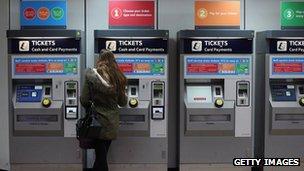Train passenger watchdog welcomes ticket initiatives
- Published

Research has shown passengers find ticket machines confusing
A train passenger watchdog has welcomed new government initiatives to improve ticketing and the way passengers with the wrong ticket are treated.
Passenger Focus said many passengers are confused by ticket machines and unsure if they have the right ticket.
Rail Minister Norman Baker said the new measures represented "a raft of improvements and greater flexibility".
On Wednesday plans were announced that could stop single fares costing almost as much as return tickets.
Measures 'give confidence'
The latest measures announced on Thursday included:
The publication of a code of conduct designed to ensure that when a passenger does not have a valid ticket their treatment is consistent across all rail operators.
The Office of Rail Regulation (ORR) overseeing the development of a code of practice which will set out industry standards for ticketing information.
An ORR study into whether the sales of tickets are in the best interests of passengers and taxpayers.
Potential rail franchisees to be judged on their commitment to improve retail and ticketing systems.
The publishing of annual surveys on how well ticket office staff, ticket machines and websites perform in terms of selling passengers the best ticket for their journey.
The adoption of Oyster card-style "smart ticketing" across the rail network in England, potentially from 2015.
The chief executive of Passenger Focus, Anthony Smith, said: "Passengers will welcome this increased focus on fares and ticketing - our research shows many are confused by ticket vending machines and are unsure if they have the right ticket for their journey.
"Developing and monitoring a code of practice should give passengers more confidence when they are buying."
He added that while an industry code of practice on the way passengers without a valid ticket are treated is "a step in the right direction", they will be "watching closely to see how it is applied".
'Complex and confusing'
Another of the other measures announced was the capping of standard single tickets at a maximum of £250 and the capping of standard return fares at £500.
The Association of Train Operating Companies (ATOC) said fares that high are not very common.
An ATOC spokesman said that overall, though, it believed the latest changes would encourage more people to travel by train.
Like Passenger Focus, the ORR said its research showed "many passengers find the current fares system to be complex, confusing and that it is difficult to identify the cheapest tickets or best journey options".
A spokesman added: "The regulator will work closely with consumer groups and the rail industry to develop standards for ticket retailing which are fit for the 21st century."
On Wednesday, the government announced plans for a pilot scheme that could see all long-distance rail tickets sold on a single-leg basis and allow passengers to "mix and match" each ticket type when planning a return journey.
It means single tickets would cost roughly half the return fare, marking a difference from the current pricing structure, in which there is sometimes little difference between the cost of the two ticket types.
Mr Baker said: "The coalition government is determined to give rail passengers a better deal. This means embracing new technology like smartcards, with all the advantages that can bring, and giving the passenger a greater voice in the future.
"These measures, coupled with the radical ticketing changes I announced earlier this week, constitute a raft of improvements and greater flexibility for passengers."
- Published13 August 2013
- Published13 August 2013
- Published22 January 2013